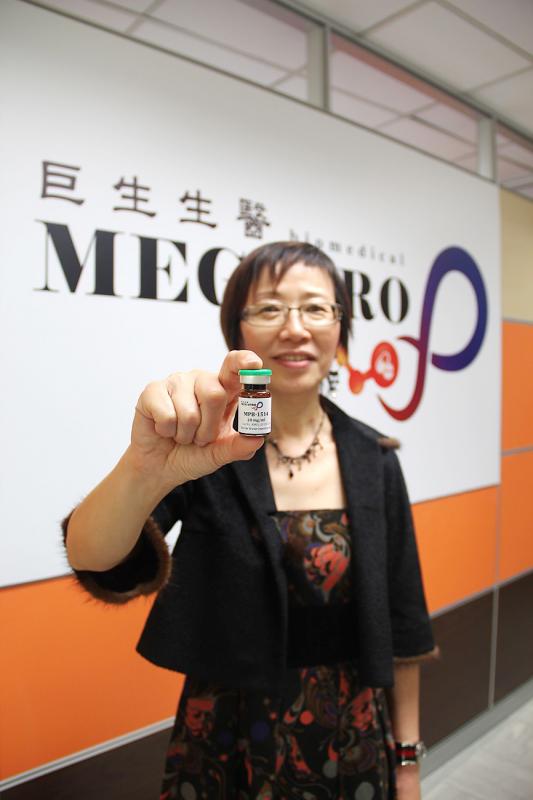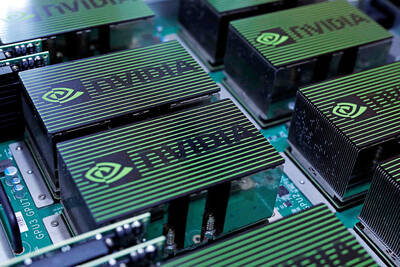Taiwan’s MegaPro Biomedical Co (巨生生醫) and China Chemical & Pharmaceutical Co (CCPC, 中國化學製藥) yesterday announced that they have set up a joint venture with China’s Wellbridge Biotech Ltd (蘇州瑋琪) focusing on the development of drugs in inhalation dosage forms.
MegaPro said it would invest about US$600,000 for a 30 percent stake in the joint venture — Trium Therapeutics Co — while CCPC and Wellbridge would hold 40 percent and 30 percent respectively.
Trium’s chairman and general manager are to be appointed by CCPC and MegaPro respectively, it said.

Photo: Grace Hung, Taipei Times
Trium’s main research goal is to meet pharmaceutical companies’ demand for non-invasive routes of drug administration, such as via the nasal cavity, to improve patients’ comfort and drugs’ bioavailability, MegaPro said.
MegaPro would utilize its expertise in improving drug delivery technology and develop new dosage forms on its nano-platform technology, it said.
MegaPro would also be responsible for conducting animal tests and human trials, it added.
CCPC, which operates Good Manufacturing Practice-certified pharmaceutical plants, as well as sales channels at home and abroad, would be responsible for mass production and marketing, while Wellbridge, which specializes in medical nebulizers, would provide technical information for the development of inhalation dosage forms and supply nebulizer equipment, the companies said.
“Oral dosage forms have been well-developed and widely used by generic drug manufacturing pharmaceutical companies. How to expand special treatment pathways has become the next phase of development in the pharmaceutical industry,” CCPC general manager Wu Zhi-yong (吳志庸) said in a statement.
Reports by Data Bridge Market Research Private Ltd, a professional research company, show that the global market for inhalers is expected to reach US$42.1 billion in 2027, with a compound annual growth rate of 5.87 percent from this year to 2027, MegaPro said.
As patients inhale the drug, its main components can be quickly absorbed by the lungs and dense blood capillaries, it said.
Trium has completed the screening of drug candidates and the preliminary animal tests, and would carry out stability tests and more animal tests, the companies said.
Spun off in 2014 from the Industrial Technology Research Institute, MegaPro focuses on developing niche nano-medicines and holds two proprietary nanotechnology platforms, with three product pipelines treating iron deficiency anemia and hepatocellular carcinoma.
MegaPro reported zero revenue for the first half of this year, while CCPC’s revenue was flat from a year earlier at NT$4.03 billion (US$135.2 million), companies’ data showed.

Leading Taiwanese bicycle brands Giant Manufacturing Co (巨大機械) and Merida Industry Co (美利達工業) on Sunday said that they have adopted measures to mitigate the impact of the tariff policies of US President Donald Trump’s administration. The US announced at the beginning of this month that it would impose a 20 percent tariff on imported goods made in Taiwan, effective on Thursday last week. The tariff would be added to other pre-existing most-favored-nation duties and industry-specific trade remedy levy, which would bring the overall tariff on Taiwan-made bicycles to between 25.5 percent and 31 percent. However, Giant did not seem too perturbed by the

AI SERVER DEMAND: ‘Overall industry demand continues to outpace supply and we are expanding capacity to meet it,’ the company’s chief executive officer said Hon Hai Precision Industry Co (鴻海精密) yesterday reported that net profit last quarter rose 27 percent from the same quarter last year on the back of demand for cloud services and high-performance computing products. Net profit surged to NT$44.36 billion (US$1.48 billion) from NT$35.04 billion a year earlier. On a quarterly basis, net profit grew 5 percent from NT$42.1 billion. Earnings per share expanded to NT$3.19 from NT$2.53 a year earlier and NT$3.03 in the first quarter. However, a sharp appreciation of the New Taiwan dollar since early May has weighed on the company’s performance, Hon Hai chief financial officer David Huang (黃德才)

NVIDIA FACTOR: Shipments of AI servers powered by GB300 chips would undergo pilot runs this quarter, with small shipments possibly starting next quarter, it said Quanta Computer Inc (廣達), which supplies artificial intelligence (AI) servers powered by Nvidia Corp chips, yesterday said that AI servers are on track to account for 70 percent of its total server revenue this year, thanks to improved yield rates and a better learning curve for Nvidia’s GB300 chip-based servers. AI servers accounted for more than 60 percent of its total server revenue in the first half of this year, Quanta chief financial officer Elton Yang (楊俊烈) told an online conference. The company’s latest production learning curve of the AI servers powered by Nvidia’s GB200 chips has improved after overcoming key component

UNPRECEDENTED DEAL: The arrangement which also includes AMD risks invalidating the national security rationale for US export controls, an expert said Nvidia Corp and Advanced Micro Devices Inc (AMD) have agreed to pay 15 percent of their revenue from Chinese artificial intelligence (AI) chip sales to the US government in a deal to secure export licenses, an unusual arrangement that might unnerve both US companies and Beijing. Nvidia plans to share 15 percent of the revenue from sales of its H20 AI accelerator in China, a person familiar with the matter said. AMD is to deliver the same share from MI308 revenue, the person added, asking for anonymity to discuss internal deliberations. The arrangement reflects US President Donald Trump’s consistent effort to engineer